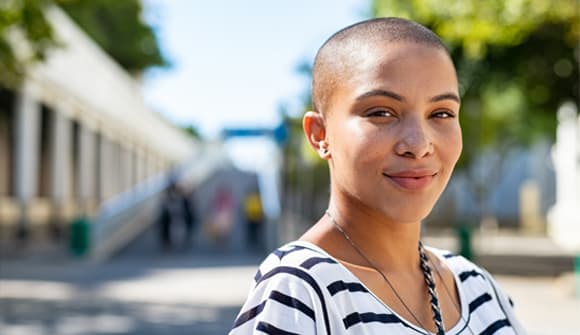Understanding alopecia
Managing the effects of hair loss and redefining beauty.
Article Date:

African American celebrities and public figures including Jada Pinkett Smith, Viola Davis and U.S. Rep. Ayanna Presley, D-Mass., have been vocal about their experiences with alopecia, or hair loss.
There are two main categories of alopecia: scarring and non-scarring. The first type involves follicular damage that causes scarring of the hair glands and permanent hair loss. In non-scarring alopecia, hair follicles are typically preserved and regrowth is possible.
Naim Quail, MD, a family physician with Baptist Primary Care, said there is no conclusive data showing alopecia is more prevalent in Black women, but this population may be more at risk of developing certain types of the condition, including traction alopecia (a non-scarring type). Dr. Quail said this results from prolonged tension on or forceful pulling of the hair, which could in some cases be caused by certain weaves, braids and wigs.
“The best thing to do to prevent traction alopecia is to educate kids, parents and hairstylists about risk factors,” Dr. Quail said. Other preventive measures include minimizing the use of styles that heat or pull the hair.
Treating alopecia is easier in its earlier stages, when people can adjust their hairstyles to minimize tension. Topical medications, local steroids and oral antibiotics are also available, Dr. Quail said.
Mental health impact
While it’s a physical condition, alopecia can also impact a person’s mental health.
Tyrenia O. Cross, a licensed mental health counselor with Baptist Behavioral Health, has dealt with alopecia firsthand and also counseled patients on how to cope with it.
“You have to learn to redefine what beauty is for you in a society that often associates having hair with being beautiful,” Cross said. “Then you can say, ‘I can accept this hair loss. This is my normal.’”
Cross, who now proudly sports her natural hair after years of styling it, works with young people to help determine what they consider to be beautiful and separate that from society’s views.
“We are the ones who are living with ourselves for the rest of our lives,” Cross said. “We have to learn to be comfortable with our skin, our hair and our bodies.”
Cross also had some tips for friends and family members of those with alopecia.
She recommended:
- Instead of stepping in and trying to help before you understand the situation, ask the person what they need and how you can help.
- Don’t act like their alopecia doesn’t exist. Be open to discussing it. Have an open dialogue about nurturing positive self-esteem.
If you’ve been diagnosed with or think you may have alopecia, talk to your Baptist Primary Care physician about the best treatment options for you. You can make an appointment with a physician near you by calling 904.202.4YOU or filling out this form.



